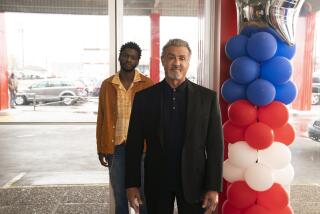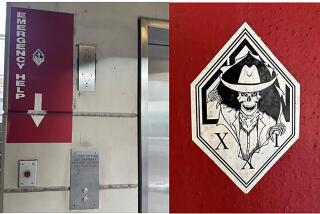Director says he disagreed with firing
- Share via
Oscar-nominated director John Singleton testified Tuesday that he disagreed when Universal Pictures fired his African American first assistant director on the 2003 movie “2 Fast 2 Furious” but didn’t fight it because he needed to finish the film.
Singleton’s remarks came on the opening day of a federal discrimination lawsuit alleging that Frank Davis was unfairly fired because of his race. Singleton, whose films include “Boyz n the Hood” and “Shaft,” acknowledged that completing the movie was more important than saving Davis’ job.
“He was my friend.... I said implicitly I did not want to fire him -- I didn’t want to be put in that position,” he said. But “I had to make my movie, man.... It was my biggest movie.... The movie is the most important thing.”
The Equal Employment Opportunity Commission, in the first racial discrimination case filed by the government against a Hollywood studio, is alleging that Universal Pictures fired Davis without cause and because he is African American.
EEOC lawyers and Davis’ attorney alleged that he was held to a higher standard than the white assistant director who eventually replaced him. The commission seeks back pay and punitive damages as well as court-enforced monitoring and oversight of the studio’s hiring and firing practices. Davis, 47, is seeking damages estimated at several million dollars.
Universal denies the charges and maintains that Davis was fired for performance reasons. Universal’s outside counsel, Steve Cochran, said in his opening statements that “Davis was not doing his job” and that crew members and the production team complained.
Singleton’s testimony conflicted at times with a deposition he gave in 2004, prompting some testy exchanges between him and Davis’ attorney, John E. Sweeney. Singleton, one of Hollywood’s top African American filmmakers, signed a multi-picture distribution deal with Universal in 2006. When Sweeney asked him whether he was working with the studio, Singleton smiled and replied, “We’ll see.”
Singleton and lawyers for both sides stressed the importance of the first assistant director. Nicknamed the “First AD,” the job involves working as the on-set liaison among the producers, the director and all department heads including costumes, casting, location managers and hair and makeup.
Singleton selected Davis after working with him on his 2001 feature, “Baby Boy” and a Burger King commercial starring basketball star Shaquille O’Neal.
“We did a good movie together and I wanted to bring him up on the next one,” he said.
As assistant director, Davis served as a buffer between the director and the producers, particularly in keeping the production on schedule and on budget. The budget on “2 Fast 2 Furious,” was about $85 million, with each day of principal photography costing about $300,000 on the sequel to the hit “The Fast and the Furious.”
Singleton told Davis that he needed at least 70 days of principal photography to shoot in Miami. But the producers informed Davis they wanted it done in 57. Davis told the producers that Singleton could not budge and, in the process, probably alienated them, Singleton said. Months after Davis was dismissed, the film was shot in about 70 days.
“I told Frank, ‘I’m going to do it like this and I don’t care what they say.’ ... He held the line for me,” said Singleton, who appeared calm and frequently smiled at Davis from the witness stand. “He was put in a hard place by myself.” Singleton said he never heard complaints about Davis until the day when several executives on the movie, including producer Neal Moritz, told him changes needed to be made.
Even though these executives did not give Singleton a concrete reason for firing Davis, Singleton said, it was clear some people on the production were not happy with his performance. According to Directors Guild of America rules, a director has to sign off on the firing of an assistant director.
“As far as I saw, he was doing a good job,” Singleton said. But, he added, “his position was very important and ... if it wasn’t working for the support team, I had to make a decision.”
Singleton will continue his testimony today.
More to Read
The biggest entertainment stories
Get our big stories about Hollywood, film, television, music, arts, culture and more right in your inbox as soon as they publish.
You may occasionally receive promotional content from the Los Angeles Times.










